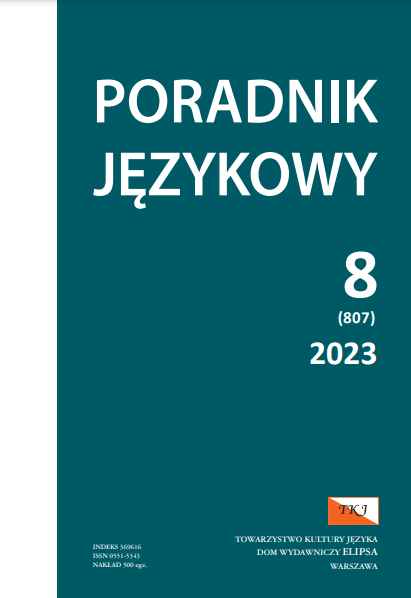LUDZKI CZŁOWIEK. O RZADKIM, LECZ INTERESUJĄCYM UŻYCIU POLSKIEGO PRZYMIOTNIKA W ZESTAWIENIU Z ANGIELSKIM HUMAN
ON A RARE, YET INTERESTING, USAGE OF THE POLISH ADJECTIVE LUDZKI COMPARED TO THE ENGLISH EQUIVALENT HUMAN
Author(s): Małgorzata CiunovičSubject(s): Comparative Linguistics, Sociolinguistics, Descriptive linguistics, Western Slavic Languages, Stylistics
Published by: Dom Wydawniczy ELIPSA
Keywords: semantics; linguistic pragmatics; ludzki; human; ludzki człowiek;
Summary/Abstract: The lexemes ludzki and human are treated (e.g. in didact cs and translation studies) as equivalents, which is reflected in the dictionary descriptions of the meanings of these words. At the same time, the analysis of the contexts where the expression ludzki człowiek is used leads to other conclusions: not all contents of the Polish adjective are present in its English equivalent. Ludzki is also ‘one who suspends the operaton of principles for the sake of another human being’. This component of a more general meaning (‘consistent with the human nature, conceived as good; hence: characterised by favourable disposition, understanding for other people; humane, merciful, gentle, kind’, SJPDor) seems to be absent from English (adjectives human and humane). This article applies the methodology based on the pragmatic analysis of the communication situation and consideration for the context of the uƩ erance/statement (aŌ er Grzegorczykowa 1990). The language material used was derived from the following corpora: NKJP (NaTI onal Corpus of Polish), BNC (British National Corpus), and COCA (Corpus of Contemporary American English).
Journal: Poradnik Językowy
- Issue Year: 2023
- Issue No: 08
- Page Range: 60-71
- Page Count: 12
- Language: Polish

